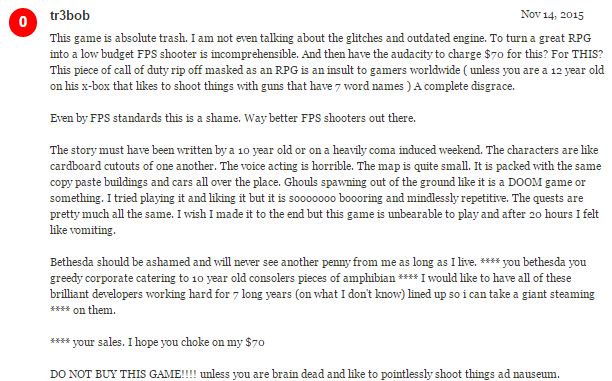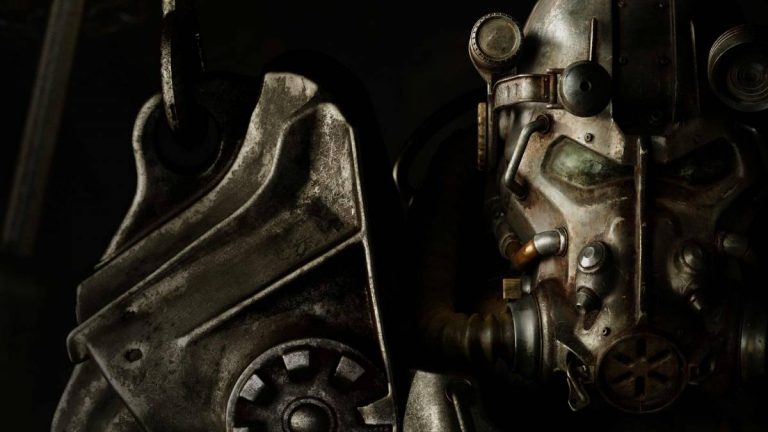One of the great things about hindsight is that you have the opportunity to look back at a job well done or an absolute fuck-up and think about how you would do things differently. The passage of time gives us all the chance to observe things with rose-tinted glasses, remembering them as far better than they actually were, something that’s especially prevalent when it comes to video games.
You see, this little indie game by the name of Fallout 4 was released last month. Bethesda’s much-anticipated open-world RPG-shooter has been the victim of nostalgia as a quick look at its Metacritic page will testify. Although critical reviews have hardly been as glowing as expected (a steady stream of 8’s across the board), it’s the user reviews where the vitriol really starts to spill out.






“If 9/11 were a video game it would be Fallout 4” may well be one of the biggest overstatements you will ever read, but it shows just how passionate people were about the game about its release. The disparity in opinions between critics and consumers for the game is one that’s almost hard to believe, reigniting the myth that journalists are being paid off by publishers for good reviews. The negative voices created a hivemind, one that swept the comment sections of websites reviewing the game. Even more confusingly, when Kotaku reviewed the game (despite being blacklisted by Bethesda for being silly buggers and then feeling sorry for themselves like abused puppies about it), the comments were supportive in the minority and somehow offended, even incredulous in the majority that it could be criticised in an opinion piece. The hype train had arrived at Kotaku Station and it wasn’t going to leave quietly.
A lot of that blame for the game’s perceived failings, however, has to fall on those who parroted the hype across their social feeds for months on end, creating an inevitable outcry when it wasn’t the perfect game media outlets had led them to believe it might just be, CV included. By cashing in on the hype with nostalgia-inducing articles and shareable images, they (and we) have contributed towards the game becoming relatively disappointing.
Don’t get me wrong, I am not as completely enamoured as I expected myself to be with Fallout 4. The story is lacking a real drive and focus, the dialogue system is effectively unnecessary and the general performance leaves a lot to be desired – check out the video below for proof.
Do all of these problems amount to a game that deserves 0/10 ratings, a score that would be too kind for the likes of Ride to Hell, a game so poor that it is genuinely unplayable? Not at all. At its core, Fallout 4 is a decent shooter that has streamlined some of the clumsier mechanics from its predecessors, but loses a lot of its charm in the process while somehow still keeping all the bugs that Bethesda are known for. However, after having recently played New Vegas to see how they compare, it’s pretty clear that 4 makes its predecessors look extremely outdated, if not mechanically, but in every other aspect. Graphics have improved, the sound design is phenomenal, the scope of things to see and do is bigger than ever before and it just feels like the next necessary step; whether it’s a step forward or to the side remains to be seen.
Fallout 4 wasn’t the only game that’s fallen foul of the hype machine this year. Anyone who’s ever played an EA game will know that they’re mostly cynically made to sell you extra DLC, but that didn’t stop people and the gaming press from jumping on the hype train for Star Wars Battlefront. When Battlefront launched, it was obvious that a lot of people would be underwhelmed – it’s a skeleton of a game that needs all of its DLC dressings to become somewhat presentable. Gamers were still largely disappointed, owing no small part to the hype and the nostalgia that the older, far better games in the series have earned over the years. If you’re looking for the best example of developers cashing in on nostalgia and hype culture, consider this: Star Wars Battlefront II, a game released ten years ago, offers far more variety, longevity and charm than its modern counterpart, two consoles down the line.
Meaningful creativity within the industry is also being suffocated because of our addiction to nostalgia as consumers. New IP’s worth a damn in the AAA market are becoming increasingly difficult to come by as the big publishers seem intent on churning out sequels, remakes and remasters at an alarming rate. It’s arguable that gaming is falling into the same cycle of repetition that Hollywood has been plagued with for years: an industry too scared to take real risks on new ideas, instead intent to lean on dependable franchises to keep the lights on. Game publishers are becoming increasingly aware of this as they depend on the hype of nostalgia when they resurrect old franchises on a more regular basis. It’s stifling creativity and pissing off legions of fans when it inevitably isn’t all they dreamed about.
If you want to see hype culture die off, stop buying into it. If we’re ever going to be able to play games properly without the inevitable hype clouding our judgements, we need to temper our expectations and not just jump on the hype train without a ticket.
Some of the coverage you find on Cultured Vultures contains affiliate links, which provide us with small commissions based on purchases made from visiting our site. We cover gaming news, movie reviews, wrestling and much more.



